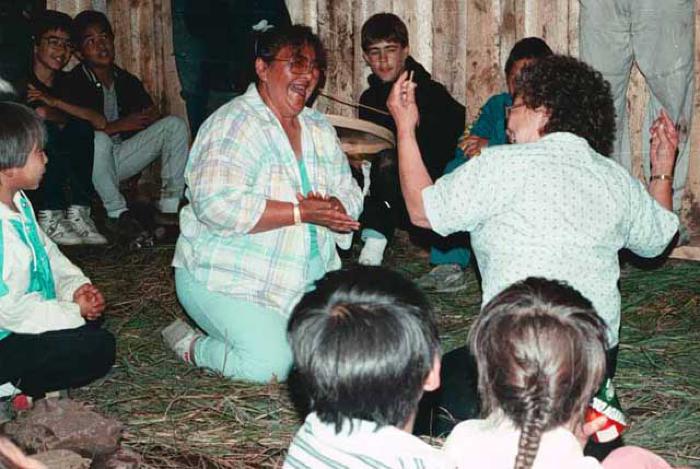Stick Guessing Game — Kaataq

Competitions were a common activity at social gatherings in classical Alutiiq society. Both men and women enjoyed participating in everything from swimming, boating, and running races to tests of strength and a variety of team sports. Competitions were a way to demonstrate one’s stamina and dexterity, and they allowed rivals to compete in a friendly arena. For example, the Alutiiq people of Prince William Sound invited neighboring Eyak and Tlingit peoples to compete in games.
In addition to their recreational qualities, some games had a spiritual component. Certain games were limited to a specific time of year because they were believed to affect the natural environment. Guessing games, like kaataq, were popular in the summer because they were thought to slow the movement of the sun.
Kaataq is a favorite game of Alutiiq men because it involves lots of singing and joking as well as careful slights of hand. In the past, men played this game in the two weeks before Lent, staying up all night to bet on the outcome of games. Old sod houses were an excellent place to play because they were warm and private. Men never played kaataq around children; it was considered appropriate only for adults.
This simple guessing game requires two-inch-long pieces of wood or bone. Men sometimes carve these gaming sticks from cedar. Although the sticks in a pair are the same size, each has different markings. One might be painted and the other not, or one might have grooves carved into it and the other not. The marked stick is the “wee” and the unmarked stick is the “dip.”
To play kaataq, two men stand facing each other. One man holds the sticks behind his back, chanting at and taunting his opponent. The holder arranges the sticks in his fist, then brings one hand to his chest and leaves the other against his back. When he says, “pick,” the challenger must guess which stick rests in the fist on the holder’s chest.
If the challenger guesses correctly, he scores one point. If the challenger guesses incorrectly, the holder receives the point. The holder can change the game by putting both sticks in the hand behind his back. When the challenger guesses an empty hand, the holder wins the point. However, if an observer catches the holder’s sleight of hand, the observer shouts “change,” and the holder must put the hand with both sticks on his chest for the challenger to select. In this case, the challenger wins the point. The first player to accumulate sixteen points wins.
